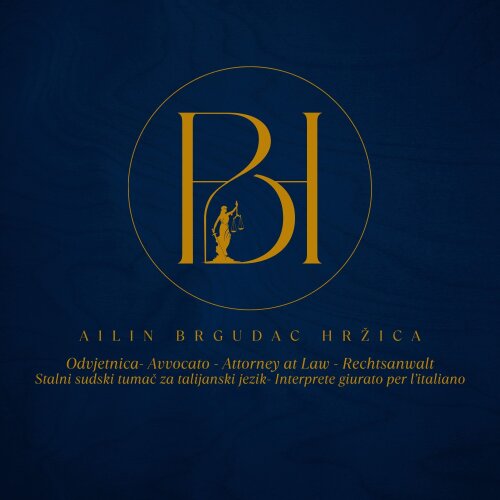Best Investment Lawyers in Croatia
Share your needs with us, get contacted by law firms.
Free. Takes 2 min.
Or refine your search by selecting a city:
List of the best lawyers in Croatia
About Investment Law in Croatia
Investment in Croatia offers a variety of opportunities due to its strategic location in Southeast Europe, stable economy, and membership in the European Union. The Croatian government actively encourages foreign investment by offering incentives, simplifying administrative procedures, and ensuring transparent business practices. Key sectors for investment include tourism, energy, infrastructure, and real estate. The legal framework for investment is governed by both national and European Union regulations, providing a secure environment for investors.
Why You May Need a Lawyer
Engaging with investment opportunities in Croatia can often require legal assistance to navigate the regulatory landscape. Here are some common situations where legal help may be necessary:
- Understanding Local Regulations: A lawyer can help interpret Croatian and EU laws to ensure compliance and secure your investments.
- Contract Law: Drafting and negotiating investment agreements or joint ventures require precise legal knowledge to protect your interests.
- Real Estate Transactions: Guidance through the complexities of property laws, zoning regulations, and acquiring permits.
- Dispute Resolution: Legal representation can be crucial for resolving disputes through arbitration or litigation.
- Intellectual Property: Safeguarding your business assets, trademarks, and patents under Croatian law.
Local Laws Overview
Croatia's legal system is based on civil law, and its investment regulations are influenced by both national legislation and EU directives. Key aspects include:
- Foreign Investment Promotion: The Foreign Investment Promotion Act facilitates foreign enterprises, offering incentives and protecting investor rights.
- Company Formation: Various business structures are available, including limited liability companies, joint-stock companies, and branch offices for foreign firms.
- Real Estate Acquisition: Foreigners, under specific conditions aligned with EU agreements, can purchase property in Croatia.
- Taxation: Understanding Croatia's tax regime is crucial, including VAT, corporate income tax, and local taxes.
- Labor Law: Compliance with employment laws and regulations is essential, covering aspects like contracts, social security, and occupational safety.
Frequently Asked Questions
1. Can foreigners invest in real estate in Croatia?
Yes, foreigners can invest in real estate, although there are certain restrictions and reciprocal agreements with their home country must exist.
2. What is the corporate tax rate in Croatia?
The corporate tax rate in Croatia varies, but as of the latest data, it is generally set at 18% for most companies.
3. Are there incentives for foreign investors in Croatia?
Yes, Croatia offers incentives, such as tax reductions, customs duty exemption, and non-repayable grants for certain sectors and projects.
4. How can I register a business in Croatia?
Registering a business involves choosing a business structure, preparing necessary documentation, and filing it with the Court Register.
5. What is the process for obtaining business permits?
The process involves complying with local regulations, zoning laws, and obtaining necessary approvals from the relevant authorities.
6. Is there protection for intellectual property in Croatia?
Yes, Croatia has robust laws protecting intellectual property rights, and these are enforced under both national and EU law.
7. What are the typical steps involved in a joint venture agreement?
The steps include negotiating terms, drafting the agreement, due diligence, and regulatory compliances, often requiring legal assistance.
8. What legal documents are essential for investment in Croatia?
Documents like investment agreements, licensing contracts, shareholder agreements, and compliance certifications are crucial.
9. How does Croatia ensure dispute resolution for investors?
Croatia provides mechanisms for dispute resolution, including arbitration and mediation, in accordance with international standards.
10. What role do local municipalities play in investment processes?
Local municipalities may be involved in processing permits, zoning approvals, and implementing regional investment strategies.
Additional Resources
For more information on investment legislation and opportunities in Croatia, the following resources can be helpful:
- Government of Croatia: Provides information on current investment policies and legal requirements.
- Invest Croatia Agency: Offers guidance and support to potential investors and updated sector-specific reports.
- Croatian Chamber of Economy: A valuable resource for business networking and understanding industrial landscapes.
- European Bank for Reconstruction and Development (EBRD): Helps investors with financing opportunities and regional insights.
Next Steps
If you require legal assistance in investment in Croatia, consider the following steps:
- Consult a Locally Registered Lawyer: Choose a lawyer familiar with Croatian investment laws and your specific industry.
- Prepare Documentation: Gather necessary documents related to your investment plans to facilitate informed legal advice.
- Research Legal Firms: Look for firms with a strong reputation in investment law and positive client testimonials.
- Schedule a Consultation: An initial meeting can help outline your needs and establish a legal strategy moving forward.
Professional legal guidance ensures that your investments in Croatia are secure, compliant, and aligned with your long-term objectives.
Lawzana helps you find the best lawyers and law firms in Croatia through a curated and pre-screened list of qualified legal professionals. Our platform offers rankings and detailed profiles of attorneys and law firms, allowing you to compare based on practice areas, including Investment, experience, and client feedback.
Each profile includes a description of the firm's areas of practice, client reviews, team members and partners, year of establishment, spoken languages, office locations, contact information, social media presence, and any published articles or resources. Most firms on our platform speak English and are experienced in both local and international legal matters.
Get a quote from top-rated law firms in Croatia — quickly, securely, and without unnecessary hassle.
Disclaimer:
The information provided on this page is for general informational purposes only and does not constitute legal advice. While we strive to ensure the accuracy and relevance of the content, legal information may change over time, and interpretations of the law can vary. You should always consult with a qualified legal professional for advice specific to your situation.
We disclaim all liability for actions taken or not taken based on the content of this page. If you believe any information is incorrect or outdated, please contact us, and we will review and update it where appropriate.
Browse investment law firms by city in Croatia
Refine your search by selecting a city.

















